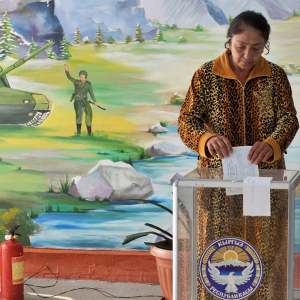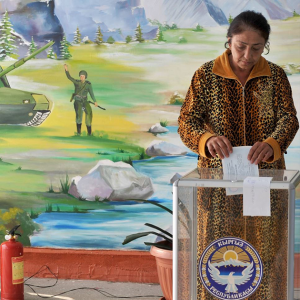

Credit: Victor Drachev/AFP via Getty Images
By Andrew Firmin
LONDON, May 5 2023 (IPS)
Where will you be in 2040? For Uzbekistan’s President Shavkat Mirziyoyev, the answer is: in the Kuksaroy Presidential Palace. That’s the chief consequence of the referendum held in the Central Asian country on 30 April.
With dissent tightly controlled in conditions of closed civic space, there was no prospect of genuine debate, a campaign against, or a no vote.
Repression betrays image of reform
Mirziyoyev took over the presidency in 2016 following the death of Islam Karimov, president for 26 years. Karimov ruled with an iron fist; Mirziyoyev has tried to position himself as a reformer by comparison.
The government rightly won international recognition when Uzbekistan was declared free of the systemic child labour and forced labour that once plagued its cotton industry. The move came after extensive international civil society campaigning, with global action compensating for the inability of domestic civil society to mobilise, given severe civic space restrictions.
While that systemic problem has been addressed, undoubtedly abuses of labour rights remain. And these are far from the only human rights violations. When one of the proposed constitutional changes announced last July sparked furious protests, the repression that followed belied Mirziyoyev’s reformist image.
Among the proposed changes was a plan to amend the status of Uzbekistan’s Karakalpakstan region. Formally, it’s an autonomous republic with the right to secede. The surprise announcement that this special status would end brought rare mass protests in the regional capital, Nukus. When local police refused to intervene, central government flew over riot police, inflaming tensions and resulting in violent clashes.
A state of emergency was imposed, tightly restricting the circulation of information. Because of this, details are scarce, but it seems some protesters started fires and tried to occupy government buildings, and riot police reportedly responded with live ammunition and an array of other forms of violence. Several people were killed and over 500 were reported to have been detained. Many received long jail sentences.
The government quickly dropped its intended change, but otherwise took a hard line, claiming the protesters were foreign-backed provocateurs trying to destabilise the country. But what happened was down to the absence of democracy. The government announced the proposed change with no consultation. All other channels for expressing dissent being blocked, the only way people could communicate their disapproval was to take to the streets.
Civic space still closed
It remains the reality that very little independent media is tolerated and journalists and bloggers experience harassment and intimidation. Vague and broad laws against the spreading of ‘false information’ and defamation give the state ample powers to block websites, a regular occurrence.
Virtually no independent civil society is allowed; most organisations that present themselves as part of civil society are government entities. Independent organisations struggle to register, particularly when they have a human rights focus. New regulations passed in June 2022 give the state oversight of activities supported by foreign donors, further restricting the space for human rights work.
It’s been a long time since Uzbekistan held any kind of recognisably democratic vote. The only presidential election with a genuine opposition candidate was held in 1991. Mirziyoyev certainly hasn’t risked a competitive election: when he last stood for office, to win his second term in 2021, he faced four pro-government candidates.
A flawed vote and a self-serving outcome
The referendum’s reported turnout and voting totals were at around the same levels as for the non-competitive presidential elections: official figures stated that 90-plus per cent endorsed the changes on a turnout of almost 85 per cent.
Given the state’s total control, voting figures are hard to trust. Even if the numbers are taken at face value, election observers from the Organization for Security and Co-operation in Europe pointed out that the referendum was held ‘in an environment that fell short of political pluralism and competition’. There was a lack of genuine debate, with very little opportunity for people to put any case against approving the changes.
State officials and resources were mobilised to encourage a yes vote and local celebrities were deployed in rallies and concerts. State media played its usual role as a presidential mouthpiece, promoting the referendum as an exercise in enhancing rights and freedoms. Anonymous journalists reported that censorship had increased ahead of the vote and they’d been ordered to cover the referendum positively.
Mirziyoyev is clearly the one who benefits. The key change is the extension of presidential terms from five to seven years. Mirziyoyev’s existing two five-year terms are wiped from the count, leaving him eligible to serve two more. Mirziyoyev has taken the same approach as authoritarian leaders the world over of reworking constitutions to stay in power. It’s hardly the act of a reformer.
The president remains all-powerful, appointing all government and security force officials. Meanwhile there’s some new language about rights and a welcome abolition of the death penalty – but no hint of changes that will allow movement towards free and fair elections, real opposition parties, independent human rights organisations and free media.
The constitution’s new language about rights will mean nothing if democratic reform doesn’t follow. But change of this kind was always possible under the old constitution – it’s always been lack of political will at the top standing in the way, and that hasn’t changed.
Democratic nations, seeking to build bridges in Central Asia to offer a counter to the region’s historical connections with Russia, may well welcome the superficial signs of reform. A UK-based public relations firm was hired to help persuade them. But they should urge the president to go much further, follow up with genuine reforms, and allow for real political competition when he inevitably stands for his third term.
Andrew Firmin is CIVICUS Editor-in-Chief, co-director and writer for CIVICUS Lens and co-author of the State of Civil Society Report.
